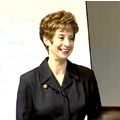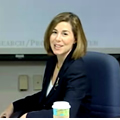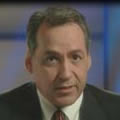The following materials were taken from a one-day training session called "Facing The Media". This training was presented at the Centers for Disease Control and Prevention in Atlanta, Georgia in December 2002. (More information about this class is available.)
Understanding a Crisis
The Media
Your Role As a Spokesperson
- Being An Effective Spokesperson
- Elements of an Effective Presentation
- Spokesperson Preparation
- Practice
- Coping with Sticky Situations
Message Development
- Course_PowerPoint_Slides.pdf (in PDF format)
- Course_PowerPoint_Slides.ppt (in
PPT format)
The course was first presented by the American Institutes for Research, Prospect Center (AIR/Prospect) in a one-day class at the Centers for Disease Control and Prevention in Atlanta, Georgia in December 2002. The class, called "Facing the Media," was attended by sixteen CDC staff members and was divided almost evenly between subject matter experts and communication specialists.
The purpose of the course was to provide top-level CDC staff with the information and skills that would help them become better spokespersons during a health crisis or emergency.
Prior to the class, each participant
was given a copy of one of three emergency public health scenarios
and asked to prepare a statement to the press. On the day of the class,
students with the same scenario participated in an on-camera press
conference. Each group’s tape was reviewed with the class and
their performance was discussed. Formal instruction and class discussion
followed. At the end of the day, each participant was interviewed one-on-one
in front of the camera. Realism was added to these mock-media interviews
by Tom Hendrick, a media specialist and veteran television correspondent
for CNN and Fox News. The class also reviewed and critiqued video tapes
of these sessions.
The course objectives were:
- Describe the importance of the spokesperson and his or her roles and responsibilities during a crisis or emergency.
- Practice practice message delivery in a realistic, high-pressure, on-camera training situation, and receive individualized feedback on performance.
The class was taught by Lynn Sokler and Linda Weinberg from American Institutes for Research, Prospect Center (AIR/Prospect), as well as Tom Hendrick of Hendrick Communications LLC.
 |
Lynn Sokler, the managing regional director of AIR/Prospect’s Atlanta office, is the director for the CDC Health Communication contract. A former news reporter, she has more than 25 years of experience in crisis and risk management and handling media during controversy for both the private and public sectors. She has trained more than 150 CEOs and senior managers to fact the media during controversies. For the CDC, she has developed and given numerous training courses to: State-based program directors on several health communication campaigns; National Center for Infectious Diseases health communications staff on working with media; and ATSDR staff on risk communication. In addition, she was a developer of and an instructor for CDC’s Crisis and Emergency Risk Communication (CERC) course.
|
 |
Linda Weinberg, a managing director at AIR/Prospect, has more than 15 years of experience in health communications, issues and crisis management, media relations, and risk communications. Some of the crisis, risk, and emergency communication work she has been involved with includes crisis planning for the CDC National Center for Environmental Health (NCEH), and crisis planning and training for the National Cancer Institute. She also was a developer of and an instructor for the CDC CERC course.
|
 |
Tom Hendrick is a media specialist and veteran television correspondent for CNN and Fox News. His award-winning news and public affairs productions have been seen by millions of viewers around the world. He holds a masters degree in communications from American University, where he is now an adjunct professor. |